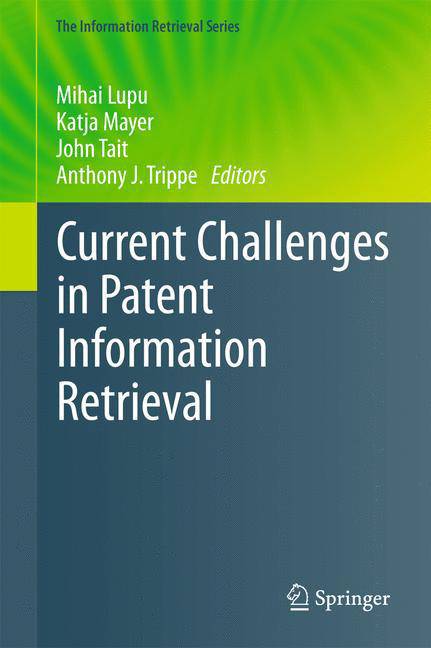
- Retrait en 2 heures
- Assortiment impressionnant
- Paiement sécurisé
- Toujours un magasin près de chez vous
- Retrait gratuit dans votre magasin Club
- 7.000.0000 titres dans notre catalogue
- Payer en toute sécurité
- Toujours un magasin près de chez vous
Current Challenges in Patent Information Retrieval
137,45 €
+ 274 points
Description
Patents form an important knowledge resource -much technical information represented in patents is not represented in scientific literature - and at the same time they are important, and economically highly relevant, legal documents. Between 1998 and 2008, the number of patent applications filed yearly worldwide grew by more than 50 percent. Yet still we see a huge gap between, on the one hand, the technologies that emerged from research labs and are in use in major Internet search engines or in enterprise search systems, and, on the other hand, the systems used daily by the patent search communities.
In the past few years, the editors have organized a series of events at the Information Retrieval Facility in Vienna, Austria, bringing together leading researchers in information retrieval (IR) and those who practice and use patent search, thus establishing an interdisciplinary dialogue between the IR and the intellectual property (IP) communities and creating a discursive as well as empirical space for sustainable discussion and innovation. This book is among the results of that joint effort. Many of the chapters were written jointly by IP and IR experts, while all chapters were reviewed by representatives of both communities, resulting in contributions that foster the proliferation and exchange of knowledge across fields and disciplinary mindsets.
Reflecting the efforts and views of both sides of the emerging patent search research and innovation community, this is a carefully selected, organized introduction to what has been achieved, and perhaps even more significantly to what remains to be achieved. The book is a valuable resource for IR researchers and IP professionals who are looking for a comprehensive overview of the state of the art in this domain.
In the past few years, the editors have organized a series of events at the Information Retrieval Facility in Vienna, Austria, bringing together leading researchers in information retrieval (IR) and those who practice and use patent search, thus establishing an interdisciplinary dialogue between the IR and the intellectual property (IP) communities and creating a discursive as well as empirical space for sustainable discussion and innovation. This book is among the results of that joint effort. Many of the chapters were written jointly by IP and IR experts, while all chapters were reviewed by representatives of both communities, resulting in contributions that foster the proliferation and exchange of knowledge across fields and disciplinary mindsets.
Reflecting the efforts and views of both sides of the emerging patent search research and innovation community, this is a carefully selected, organized introduction to what has been achieved, and perhaps even more significantly to what remains to be achieved. The book is a valuable resource for IR researchers and IP professionals who are looking for a comprehensive overview of the state of the art in this domain.
Spécifications
Parties prenantes
- Editeur:
Contenu
- Nombre de pages :
- 418
- Langue:
- Anglais
- Collection :
- Tome:
- n° 29
Caractéristiques
- EAN:
- 9783642192302
- Format:
- Livre relié
- Poids :
- 764 g

Seulement chez Librairie Club
+ 274 points sur votre carte client de Librairie Club
Les avis
Nous publions uniquement les avis qui respectent les conditions requises. Consultez nos conditions pour les avis.




